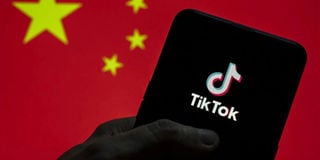Study finds TikTok mutes dissent against China

What you need to know:
For the study, researchers set up 24 accounts on TikTok, Instagram, and YouTube, simulating 16-year-old users in the U.S. They tested the algorithms of these platforms using four keywords linked to the CCP’s human rights violations: “Uyghur,” “Xinjiang,” “Tibet,” and “Tiananmen.”
A recent study reveals that TikTok, a video-sharing app owned by China, manipulates its algorithms to suppress content exposing China’s human rights violations, thereby shaping the views of its users. Researchers from Rutgers University and the Network Contagion Research Institute (NCRI) discovered that TikTok’s algorithms not only suppress content critical of the Chinese Communist Party (CCP) but also amplify pro-China propaganda and irrelevant content.
The study highlights that travel influencers, frontier lifestyle accounts, and other CCP-linked content creators are used to drown out sensitive discussions on issues like ethnic genocide and human rights abuses.
TikTok has come under scrutiny for being a potential national security threat, particularly for its influence on American teens. Its parent company, Bytedance, based in China, could be compelled by the CCP to provide data on U.S. users. The U.S. National Security Agency has labeled the app a “Trojan horse,” and some lawmakers have compared it to “digital fentanyl” due to its addictive nature.
In April, President Joe Biden enacted a bipartisan law mandating that ByteDance either divest TikTok or face a ban from U.S. mobile app stores and web-hosting services. In response, ByteDance and TikTok have initiated a lawsuit contesting the law's constitutionality.
A recent report indicated that TikTok has effectively engaged in “successful indoctrination” of its users, especially among those who use the app frequently, as evidenced by shifts in their perceptions of China, according to a psychological survey.
The researchers noted that these users, influenced by targeted content and curated information environments that suppress free speech, seem to absorb biased narratives without realizing it, resulting in a skewed understanding of significant global issues.
A TikTok representative addressed these findings in an email to The Epoch Times, asserting that the study was a “non-peer-reviewed, flawed experiment ... clearly engineered to reach a false, predetermined conclusion.” The spokesperson further claimed, “Previous research by NCRI has been discredited by external analysts, and this latest paper suffers from similar flaws.”
For the study, researchers set up 24 accounts on TikTok, Instagram, and YouTube, simulating 16-year-old users in the U.S. They tested the algorithms of these platforms using four keywords linked to the CCP’s human rights violations: “Uyghur,” “Xinjiang,” “Tibet,” and “Tiananmen.” Both the Trump and Biden administrations have labeled the CCP’s actions against Uyghurs in Xinjiang as “genocide” and “crimes against humanity,” while Tibet has become a surveillance state with labor camps.
On June 4, 1989, the Chinese government commanded its troops to fire on student protesters and unarmed civilians at Tiananmen Square in Beijing. Despite thousands of witnesses, the regime denies instigating the violent crackdown, and discussing the protest movement remains a sensitive topic in both China and Hong Kong. Researchers gathered over 3,400 videos based on four keywords, categorizing each as “pro-China,” “anti-China,” “neutral,” or “irrelevant.”
Regarding Xinjiang, a “pro-China” video might showcase minority folk traditions or idealized rural scenes, while an “anti-China” video could highlight the struggles of Uyghurs or advocate for boycotts of Xinjiang products. The report reveals that only 2.3% of TikTok’s search results for “Xinjiang” were deemed “anti-China,” compared to 21.7% on YouTube and 17.3% on Instagram. For “Tiananmen,” over 26% of TikTok results were “pro-China,” whereas YouTube had 7.7% and Instagram 16.3%.
The report indicates that a “pro-China” video regarding Tiananmen might include “denials of the massacre and revisionist historical perspectives” or feature picturesque images of the square without mentioning the tragedy. When examining search results for “Tibet,” TikTok showed the least anti-China content at 5% and the highest pro-China content at 30.1% among the three platforms.
A “pro-China” video on Tibet often reinforces CCP narratives about its “liberation,” while “anti-China” content may depict Tibetan protests or highlight cultural erasure by the CCP. The report notes that TikTok’s algorithm appears to favor pro-China content in terms of views per like, a trend significantly more pronounced on TikTok compared to YouTube, indicating a potential bias specific to TikTok.
Specialists additionally studied 1,214 American TikTok clients, looking to comprehend their view of China in light of the time they spent on the application. Weighty clients of
TikTok — those utilizing the application for over three hours out of every day — showed a 49 percent increment in energy toward the CCP's common liberties records comparative with nonusers. For those utilizing the application for 15 minutes to three hours, the percent increment was 36%. "Paradoxically, utilization of YouTube and Instagram showed no huge relationship on clients' view of China's common liberties record," the report peruses.
"This proposes that TikTok's substance might add to mental control of clients, lining up with the CCP's essential target of moulding positive discernments among youthful crowds." Weighty TikTok clients likewise showed a 48 percent expansion in the insight that "Tiananmen Square is generally known as a traveler site." Specialists suggested the formation of a City Trust subsidized by web-based entertainment stages and people in general to assist with distinguishing stages that are controlling client insights.
"Assuming online entertainment calculations are viewed as undermining the very majority rule governments that give them the opportunity to work, they are both unfair and risky," the report peruses. "There should be responsibility and restorative measures to guarantee that stages are not taken advantage of by state entertainers to disintegrate majority rule establishments and values."



